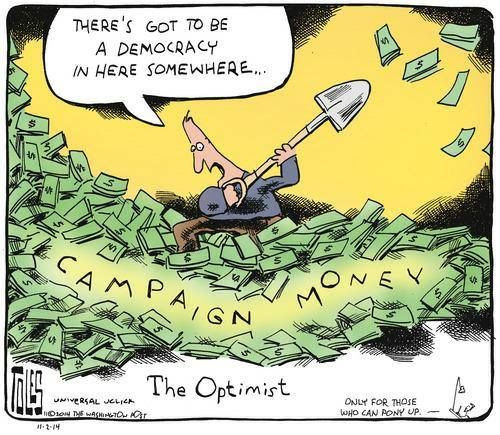
Dark Money LLCs, Corporate Donations and Bills to Stop Them
When wealthy donors max out their individual donations to a candidate's campaign, they look other instruments to influence the election. Enter the lowly Limited Liability Corporation, or LLC. Due to a federal loophole, not only can an LLC make donations to a political committee or political party, those donations are totally anonymous.
 To combat this infiltration of money into campaigns, there are two bills are before the Senate Election Law and Municipal Affairs Committee, SB 155 and SB 156. SB156 would require individuals making political contributions via an LLC to reveal their name, and their share of the LLC's donation amount.
To combat this infiltration of money into campaigns, there are two bills are before the Senate Election Law and Municipal Affairs Committee, SB 155 and SB 156. SB156 would require individuals making political contributions via an LLC to reveal their name, and their share of the LLC's donation amount.
Here's another factoid: Since 2000 it has been legal for a business in NH to make a campaign donation directly to a candidate's campaign. (No influence there, eh?) See a further history later in this newsletter, but SB 155 modifies RSA 664 and prohibits that practice in New Hampshire. Businesses could continue to make contributions to political action committees, but not directly to the candidate.
We urge you to call or email the members of the Senate Election Law & Municipal Affairs Committee to let them know how important it is that we close those loopholes to keep our democracy from being infiltrated by the influence of dark money.
Voter-Owned Elections Act Finally Has a Number: SB 304
 Delays in State House legislative services have now cleared, and the Voter-Owned Elections Act finally has a bill number: SB 304. Open Democracy Action has been visiting senators, answering questions about the bill and how Voter Dollars work. We anticipate a committee hearing in the week of Feb. 10, but it has not yet been posted. Now is a good time to write letters to the editor to help educate voters on how this bill benefits everyday voters, not big donors.
Delays in State House legislative services have now cleared, and the Voter-Owned Elections Act finally has a bill number: SB 304. Open Democracy Action has been visiting senators, answering questions about the bill and how Voter Dollars work. We anticipate a committee hearing in the week of Feb. 10, but it has not yet been posted. Now is a good time to write letters to the editor to help educate voters on how this bill benefits everyday voters, not big donors.
UPCOMING HEARINGS AND VOTES
Red = ODA Priority Bill
TUESDAY, FEBRUARY 5, 2019
HOUSE ELECTION LAW, Room 308, LOB – Executive Session
10:00 a.m. Executive session on
HB 429, establishing a committee to study ways to improve civic engagement in New Hampshire Supported by ODA, recommend OTP ;
HB 505, allowing voters to vote for multiple candidates for an office;
HB 374, prohibiting certain state officers from forming political action committees;
HB 147, relative to appeals from recounts;
HB 297, relative to political advertisements on behalf of political committees or advocacy organizations. Supported by ODA, recommend OTP
WEDNESDAY, FEBRUARY 6, 2019
* Supported with our Voting Rights allies – Recommend OT
HOUSE ELECTION LAW, Room 308, LOB
10:00 a.m. Executive session on the following bills:
-
*CACR 5, relating to the right to vote. Providing that 17 year olds who will be eligible to vote the general election be permitted to vote on that election’s primary election;
-
HB 152, increasing the threshold for reporting by political committees. This bill removes the exception from required lobbyist registration for certain communications by an employee on behalf of his or her employer. Sponsored by Marjorie Smith , Martha Fuller Clark, Daniel Eaton, and Mary Heath. Opposed by ODA!
-
HB 202, relative to requirements for presidential primary candidates;
-
CACR 6*,, relating to elections. Providing that any inhabitant who so desires may vote by absentee ballot in primary and general elections;
-
HB 431, relative to election officers at additional polling places;
-
HB 345*, relative to certification of devices for the electronic counting of ballots. This bill asks the Ballot Law Commission to examine voting machines upon request or a minimum of every five years to insure election integrity. Sponsors: Patrick Long, Paul Bergeron
-
HB 440, relative to disclosure of federal tax information as a condition of eligibility for federal office.
HOUSE LEGISLATIVE ADMINISTRATION, Room 303, LOB
10:00 a.m. HB456, relative to persons required to register as a lobbyist. This bill removes the exception from required lobbyist registration for certain communications by an employee on behalf of his or her employer. Sponsored by Marjorie Smith , Martha Fuller Clark, Daniel Eaton, and Mary Heath.
11:15 a.m. HB519, relative to selection of delegates to an Article V convention. Prior to a U.S. Constitutional Convention being convened, this bill establishes guidelines for who shall represent New Hampshire at that convention. Delegates carry out both a state and federal government role, and have substantive power. As a result, democracy advocates have been wary about unintended consequences of a Constitutional Convention if delegates are not impartial, or who don't carry out the instructions of the legislature.
1:30 p.m. Executive session on several pending bills, including:
HB 441, relative to disclosure of the source of legislative bill proposals and the disclosure of certain information by lobbyists. The American Legislative Exchange Council, or ALEC, is famous for disseminating its boilerplate bills through local state legislators. When such legislation is proposed in the NH legislature, this bill would require disclosure of the source of that bill. Open Democracy Action also uses such model legislation, but fully supports disclosure to increase transparency. Supported by ODA, recommend OTP
 Need to call legislators on a committee? Go here for phone numbers and links!
Need to call legislators on a committee? Go here for phone numbers and links!
SENATE ELECTION LAW AND MUNICIPAL AFFAIRS, Room 102, LOB
Sen. Levesque (C), Sen. Sherman (VC), Sen. Morgan, Sen. Birdsell, Sen. Gray
9:00 a.m.
![]() 9:15 a.m. SB 156, relative to political contributions made by limited liability companies: This bill will fix a loophole in current federal legislation to get around campaign contribution limits by anonymously donating to an LLC corporation. The bill apportions the donation amounts by that person's share in the LLC, and requires that names and addresses be disclosed when reporting to the NH Secretary of State. Sponsors Senators Dan Feltes, Martha Hennessey, & Melanie Levesque, and Represenative Sandra Keans. Supported by ODA, recommend OTP - Attend the hearing!
9:15 a.m. SB 156, relative to political contributions made by limited liability companies: This bill will fix a loophole in current federal legislation to get around campaign contribution limits by anonymously donating to an LLC corporation. The bill apportions the donation amounts by that person's share in the LLC, and requires that names and addresses be disclosed when reporting to the NH Secretary of State. Sponsors Senators Dan Feltes, Martha Hennessey, & Melanie Levesque, and Represenative Sandra Keans. Supported by ODA, recommend OTP - Attend the hearing!
 9:30 a.m. SB 155, relative to permissible campaign contributions by business organizations. Prior to the year 2000, RSA 664 barred “business entities” from making political contributions directly to a candidate. A court case deemed the language in RSA 664 too broad, and the legislature struck the “business entity” language from the law. As a result, for the last 18 years, business donations to candidates have not been prohibited. SB 155 restores the “business entity” language, and because language of allowing donations to “Segregated Funds” not controlled by the candidates – political action committees – had already been added, the bill is now acceptable to the courts. Important note: If this bill passes, SB 156 becomes moot, as an LLC is a business entity. Supported by ODA, recommend OTP - Attend the hearing!
9:30 a.m. SB 155, relative to permissible campaign contributions by business organizations. Prior to the year 2000, RSA 664 barred “business entities” from making political contributions directly to a candidate. A court case deemed the language in RSA 664 too broad, and the legislature struck the “business entity” language from the law. As a result, for the last 18 years, business donations to candidates have not been prohibited. SB 155 restores the “business entity” language, and because language of allowing donations to “Segregated Funds” not controlled by the candidates – political action committees – had already been added, the bill is now acceptable to the courts. Important note: If this bill passes, SB 156 becomes moot, as an LLC is a business entity. Supported by ODA, recommend OTP - Attend the hearing!
10:00 a.m. SB 305, relative to voter registrations accepted by other state agencies. A so-called “Motor-Voter” bill, which allows a domiciled resident to register to vote when obtaining a NH State driver's license or identification. Supported by ODA with its voting rights partners.
10:45 a.m. SB 231, promoting truth in political advertising. Responding to political advertising in past years designed to deceive, SB 231 creates a mechanism in RSA 664 to respond to claims of false political advertising and take actions with those who disseminate it, with fines of $2,500 per offense. Supported by ODA
THURSDAY, FEBRUARY 7, 2019
HOUSE CRIMINAL JUSTICE AND PUBLIC SAFETY, Room 204, LOB
10:00 a.m. Executive session on HB 486, relative to department of corrections procedures concerning the requirement for restoration of the voting rights of felons.
HOUSE STATE-FEDERAL RELATIONS AND VETERANS AFFAIRS, Room 206, LOB
10:00 a.m. Executive session on:
HCR 5 A resolution requesting the United States Congress to propose a constitutional amendment to reverse the ruling of the United States Supreme Court in Citizens United v. Federal Election Commission. Testimony was overwhelmingly in favor of this bill, including from ODA, with a huge turnout during the hearing. This bill is sponsored by Representatives Kat McGhee and Peter Petrigno from Hillsborough County. Supported by ODA, recommend OTP
SENATE ELECTION LAW AND MUNICIPAL AFFAIRS, Room 102, LOB
Sen. Levesque (C), Sen. Sherman (VC), Sen. Morgan, Sen. Birdsell, Sen. Gray
1:00 p.m. EXECUTIVE SESSION ON PENDING LEGISLATION
Although the Election Law & Municipal Affairs calendar is not specific, Executive Session bills
MAY include:
SB 44, relative to election procedures, delivery of ballots, and assents to candidacy.
SB 68, relative to the centralized voter registration database.
SB 105-FN, relative to contributions to inaugural committees.
SB 45, relative to electioneering at polling places.
SB 66, relative to political contributions by candidates for certain offices.
SB 10210:30 a.m. , requiring disclosure of federal income tax returns by presidential and
vice-presidential candidates.
SB 153, establishing state holidays for biennial state primary elections and
quadrennial presidential primary elections.
Last Week's Hearings
Last week's ODA focus was on redistricting. The hearing for HB 706's extensive bill lays out a plan for a commission to convene every 10 years, comprised of selected citizens who are not highly political. It excludes political party leaders, lobbyists, big donors, but does have equal numbers of the two largest parties (1/3 + 1/3), as well as an equal share of smaller parties and independents (1/3). The hearing was well-attended and had only two speakers against the bill, one of whom was out of state.
ODA Policy Committee Co-Chair Rick Bourdon testified in favor of the bill, citing the “efficiency gap,” an analysis tool for identifying the impact of a gerrymandered voting district. Bourdon said,
“The 2016 data points the finger at Republicans, but it matters not to me which party did what when. Clear evidence from other states shows that the Democratic party is guilty of gerrymandering as well. It's time for an end to the practice. Redistricting for partisan advantage is undemocratic (small d) and flies in the face of the principle of one person one vote. A nonpartisan redistricting commission is the logical solution, a solution being chosen by more and more states across the country.”
Questions from legislators centered about reconciling this bill, calling for the commission, with CACR 9 , a NH constitutional amendment which takes some of the same steps, but by a different method. Open Democracy asks that both bills move forward, and that amendments can be put in place to make the bills complementary. Supported by ODA - This is a mission-critical bill, so please call your legislators.
LEGISLATION WE'RE WATCHING THIS TERM
For updates and descriptions of the other important democracy legislation this session, click on the links below.
 Public funding
Public funding
Redistricting and ending gerrymandering
Campaign reform
Money in politics
Questions? Want to Help?
Olivia Zink: [email protected]; (603) 661-8621 (cell)
Rick Bourdon: [email protected]; (603) 795-2818; (603) 759-1888 (cell)
Brian Beihl: [email protected] (603) 620-8300 (cell)



Showing 1 reaction
Sign in with